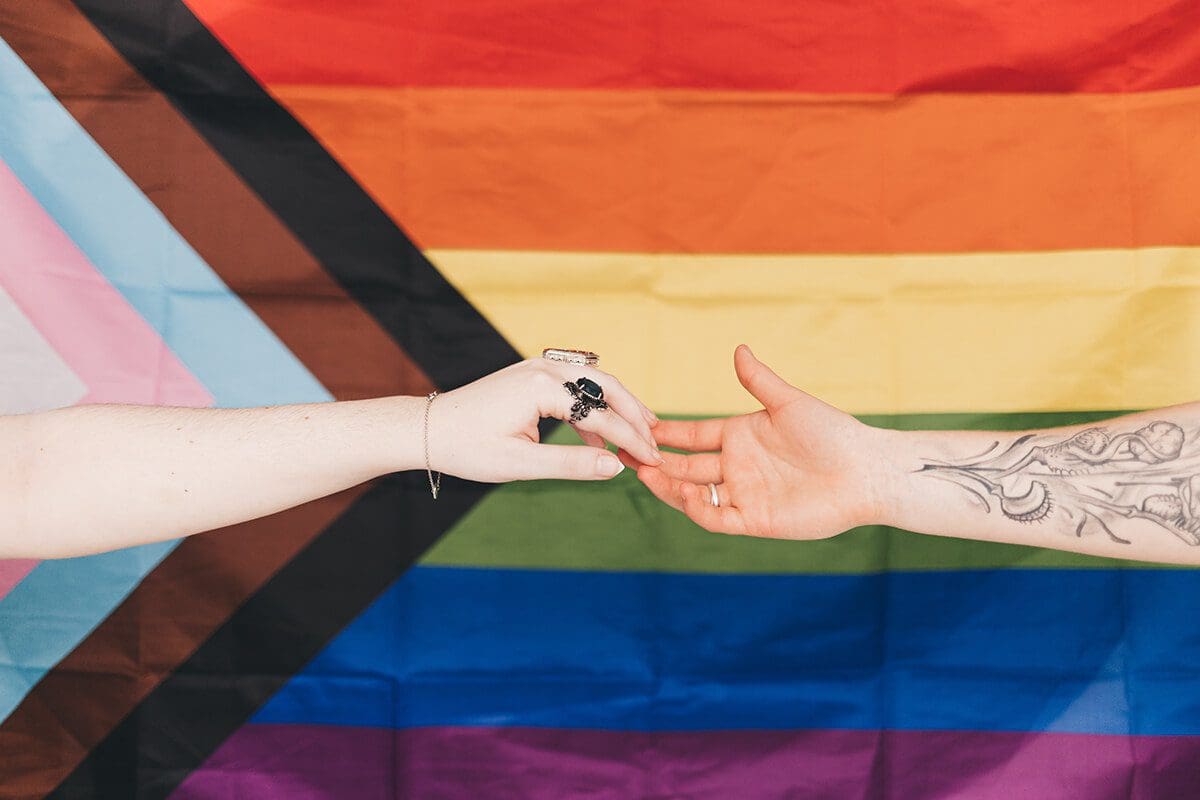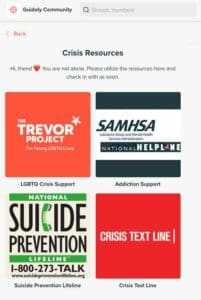This month, we’ve been providing you with resources around communication. We wanted to highlight a few of our Guides who are members of the LGBTQ+ community and hear tips on communication through their lens. Read on to learn more.
Our LGBTQ+ community Guides
We’re excited to present two of our Guides who are members of the LGBTQ+ community to share their stories. We reached out and asked them to share a little bit about their expertise and their communication tips.
Guide Jerome Imhoff is a life coach who specializes in spirituality, communication, creativity and self discovery with a focus on helping you see your inherent divinity. He helps his clients by using an eclectic approach to empower and remove life blocks.
Guide Deano Sutter is an Executive Mindset Coach, best selling author, and the founder of the Rising Tides Club which is a men’s club. His mission is to help high achieving men grow internally, connect externally and achieve meaningful impact in every area of their life.
What brought you to Guidely, and what are your specialties?
Guide Jerome Imhoff:
I believe I was among the first Guides invited to join Guidely in 2020. I was inspired by Guidely’s mission and truly believe in Guidely’s potential to transform the world in ripple effects. The Guidely tagline is “Never Walk Alone,” and I find that concept to be very powerful. As humans we are communal in nature; we need one another as companions on this great journey of life. We all need guidance from time-to-time, and even more, we need others to hold space for us, to bear witness to our lives.
Joining Guidely has been such a gift to me because it has allowed me to engage with others who are interested in personal transformation. Through Guidely I have found a tribe of like-minded and like-hearted people who are wanting to do more than just muddle through life. They are committed to showing up in authenticity and to striving for excellence.
As a Guide, my focus is on spirituality and creativity. I am a certified Neuro-Linguistic Programming (NLP) Practitioner, a certified ARTbundance™ Coach and Practitioner, and a dedicated student of A Course in Miracles. My work is all about helping others to understand their own connection to the Divine. When we can truly understand how deeply and intimately we are loved by the Source of All Things, the Creator of All That Is, that energy some of us call God, our lives open up to profound possibility. When we see ourselves as love and light temporarily living in a body, we can step into our true power as co-creators with the Great Creator.
I use NLP processes along with creative and spiritual practices to assist my clients in dismantling limiting beliefs, clearing the blocks leftover by trauma, and stepping into their own power. My approach in working with clients is very intuitive and eclectic. It all begins with seeing those who seek my guidance as perfect, whole, and complete and acting as a mirror. I never seek to change anyone but rather to empower others to find their own true north and to leverage a power that has always existed within.
Guide Deano Sutter:
A dear friend and phenomenal coach, Linda, made the suggestion. After some research and investigation on Guidely Co-Founders Amir and Shannon, I told her to make the introduction. I am so happy she did. What Guidely is creating is a safe intentional environment for people to grow in any area of their life and through multiple modalities. The community itself is like a warm embrace and the people they have assembled are some of the best in the world.
My specialty is a research backed system leveraging CBT and NLP to help people defeat the viruses and bullies in their head. There are programs from our past that are dictating our present and limiting our future … and we don’t even know it. It’s stored in the cache of our subconscious, and executed every time we are triggered. So I help people bring consciousness to the programs, equip them with specific tools to diffuse them, so they can choose their future.
What advice would you give your younger self?
Guide Jerome Imhoff:
The fashion designer Brandon Maxwell told the designers on Project Runway this past season to “lean into whoever the hell you are.” That resonated with me so much, and that is what I would tell my younger self.
As a young gay boy growing up in the small town of Sturgis, South Dakota, I hid who I was in a lot of ways.
I didn’t come out until I was 31 years old. I had been married to a wonderful woman (we are still the best of friends) and I was teaching music at a Catholic school. I was forced to resign my teaching position because I was gay, and the marriage ended at about the same time. I knew that I was gay by the time I was in the third grade, but I believed I needed to make other choices for my life in order to be accepted by God and to live a life of holiness.
What I learned was that the things I was seeking were only available to me when I was willing to be who I truly am. But I was so scared to be that boy, to be that young man. So, I would tell my younger self that we all are in the process of becoming.
We are all continuing to evolve. AND this process is much, much easier when we are unapologetically our most authentic selves. True, some people may not like who we really are. In fact, some may very overtly reject us. But what matters most is being able to look into the mirror each day and know that you are showing up as you truly are.
When you show up as you really and truly are, people will LOVE you. That’s when life begins to really happen.
Guide Deano Sutter:
I would tell myself: The reason you people-please and long for validation is because you have been programmed at a young age that others define your worth. Things like parents, sports, grades, popularity, likes, follows, etc.
In reality, none of those will satisfy. There will always be better looking, more fit, more intelligent, more wealthy, more popular … it’s a losing battle. Go inward and learn about what makes you unique, special, significant, important … and then really start to be grateful for our uniqueness, beauty and gifts.
We all know the rarest item is the most valuable. Rare diamond, rare artifact, rare painting … well, there’s only one of us, why do we want to be like everyone else? Celebrate your uniqueness. And others will too.
What are your top 3 communication tips?
Guide Jerome Imhoff:
- Communication begins first and foremost with deep inner listening. By that I mean we must listen to what one of my mentors, the author SARK, calls the Inner Wise Self. For any communication to be effective we have to be so in touch with what’s going on in and around us that what we say can only be honest. When we are in tune with ourselves, we can speak our truth without shame or judgment.
- Use “I messages.” I know it’s really a cliché, but it’s important that we communicate from our own point-of-view only. It’s so easy to assume we know what’s going on inside someone else, but it’s never possible unless the other tells us. So, in communication I try to avoid saying things like “You think… You feel… You said…” We are all 100% responsible for our own experiences of life. We are at the effect of our own interpretations of situations and our thoughts. When we speak from a place of our own awareness and take responsibility for our assumptions, judgments, etc. we are much more effective.
- Maintain a focus on empathy. The goal of communication should always be to arrive at greater understanding. If I can be empathetic and take care to respect and honor the other with whom I am communicating, I will always feel better about the communication. That doesn’t mean I will always agree with everyone. It simply means that I listen attentively to what is being said. I do my best to understand the message and ask questions respectfully to arrive at that understanding. I then share my message so that the other can understand my viewpoint. It is possible for two people to share differing viewpoints and personal truths openly and respectfully if we first remember that all of us are one.
Guide Deano Sutter:
- When you are being triggered, an old program/virus is taking over and hijacking your emotions, leading you to an all too familiar response. To disrupt this program/pattern say these two words, “that’s interesting”. It shifts your mind from accusation to investigation, where you can more fairly observe all the facts of the situation and choose a response.
- When we are being triggered, we are making something external mean something internal, and 99.9% of the time, it’s not about us. So remind yourself, over and over, this is not about me. The way I respond is about me.
- Start to view the world through the idea of programming. Each of us have programs from the past that are plaguing our present and making us act in ways we are not proud of. Most are on autopilot, stored in our subconscious, so not in our control. Therefore, the same way we want grace from others when we say or do things we are not proud of, we should give that same grace to others. When you have this perspective, it diffuses the temptation to judge and accuse and instead raises your empathy and ability to connect.

What does Pride mean to you?
Guide Jerome Imhoff:
Pride is a time of celebration, a time to gather as a community, and a time for activism. Whenever I watch a Pride parade, I am always most moved by the PFLAG contingent and other groups of LGBTQIA+ allies. In my life, I strive to practice radical acceptance of myself and others. Seeing these allies marching to support those they love is really beautiful. When I came out, my entire family came out in many ways. I was lucky to be loved and accepted by my family and most of my friends.
A huge part of Pride for me is acknowledging and offering gratitude for something I did not choose.
I grew up Roman Catholic and for the first 31 years of my life, I denied who I truly was and would have done anything to be ‘normal.’ 20+ years later I am grateful that I am gay. I have come to understand that all of the best things about me – my sensitivity, my spirituality, my creativity, my compassion – are due, in large part, to the fact that I am gay. I am truly grateful and proud l that I am a flamBOYant, eccentric, and fabulous gay man!
Guide Deano Sutter:
I had a conversation with a friend who said, why do you need a month, you should have Pride every month. I chuckled because he clearly doesn’t get it.
Pride is about awareness, just like Black History Month and Women’s History Month. It’s for the communities who have been marginalized and persecuted throughout history, so we can help others understand the plight of both the gay community and by proxy all “other” communities.
It’s a month where we can hopefully bridge the empathy gap to realize that though we are different, we are still the same … we are human. We want the same things. Love, hope, and connection. That’s what Pride means to me.
The Origins of Pride Month
Pride month is an annual, global event which is celebrated every June. The first Pride march was celebrated on June 28th, 1970, in New York. It was organized and lead by Brenda Howard, a bisexual activist. This event had both an element of celebration and protest, which spawned the gay rights movement and pride parades around the world.
Celebrating Pride means celebrating people from the LGBTQ+ community. Celebrating their expressions, their being, and celebrating their life. It’s an opportunity for those who are part of the LGBTQ+ community to celebrate themselves in a safe environment, through marches, events, shows, etc. This is also a time to address still problematic issues surrounding the LGBTQ+ community; such as inequality, homophobia, hate crimes, rejection from family, friends, teachers and more.
Discrimination Against The LGBTQ+ Community:
To acknowledge the strides the LGBTQ+ community has made, we researched its history of discrimination. In 2021 The Trevor Project set out a survey on LGBTQ+ youth mental health and found that:
- 75% of LGBTQ+ youth reported that they had experienced discrimination based on their sexual orientation or gender identity at least once in their lifetime.
- 67% of Black LGBTQ youth and 60% of Asian/Pacific Islander LGBTQ youth reported discrimination based on their race/ethnicity in the past year.
- 13% of LGBTQ youth reported being subjected to conversion therapy, with 83% reporting it occurred when they were under age 18.
- 42% of LGBTQ youth seriously considered attempting suicide in the past year, including more than half of transgender and nonbinary youth.
Another survey taken in 2013 by Pew Research Center explains how adult LGBTQ+ community members have experienced discrimination after coming out:
- About four-in-ten (39%) say that at some point in their lives they were rejected by a family member or close friend because of their sexual orientation or gender identity.
- 30% say they have been physically attacked or threatened.
- 29% say they have been made to feel unwelcome in a place of worship.
- 21% say they have been treated unfairly by an employer.
- About six-in-ten (58%) say they’ve been the target of slurs or jokes.

You can work with Deano or Jerome by clicking on the buttons below, or find support from others in our Guidely Community App.
Crisis resources:
The Trevor Project is currently listed in Guidely’s Crisis Resources within our app.




